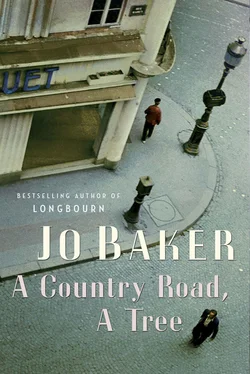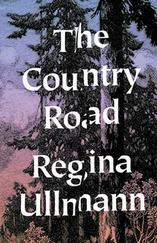“You know the Wake better than anybody else. You know it inside out. You’ve been up to your elbows in it, up to your oxters; you were there all along. So you know what it is, and what it should be seen to be.”
He nods. He knows. He knows. Of course he knows.
“What will you do?” Joyce asks him suddenly.
He pauses, caught off guard. “Drive an ambulance, I rather thought.”
“They’ll have you, will they?”
“I’ll have to look into it.”
“Ah well, yes,” Joyce says. “Well, of course, you see, you’re young.”
He nods. He swills the wine that the other man has chosen, and lets the other man talk, and does not speak any of the sentences that clot and collapse and disperse inside his head.
—
They make their way back just a shade before ten. It’s a damp, still night, and it’s difficult in the blue underwater light, and at the corner Joyce hesitates; he feels his way forward with his stick.
“Filthy night.”
“It is indeed. Here.”
He offers his arm. The older man turns his head blindly.
“My arm…,” he offers again.
He guides him down off the pavement; they cross the cobbles together. He curtails his stride.
“Here’s the kerb,” he says.
“And here’s the steeple.”
The two of them push into the lobby of the Joyces’ apartment building. It is brighter there, a small gas mantle glows. They make their farewells, Good night, God bless, all the old reflexes. Joyce taps across to the lift, his good coat draping warm around him, his hat tamped neatly into place, doing a fair approximation of sobriety. Half-cut, the rush of love for him is overpowering. That James Joyce would consider his company acceptable, when he himself can hardly bear it.
Joyce gets into the lift and pulls the cage across. But before he is whisked aloft: “Ah, and I have a little something for you. I forgot.”
“Oh.”
“I’ll have it sent it round.”
“Thank you—”
But then Shem is gone, hauled up through the dark storeys of the building towards the apartment stacked with boxes, with dust rings on the sideboard from where the ornaments are gone. He is left alone, on the bright-tiled lobby floor, in the cold. Nora will be cross. And she’ll consider him responsible for her husband’s absconding and his state on his return. As though he had bought the wine and held the gentleman’s nose and poured it in.
He pulls his jacket collar up and shoves his way out again. The night streams past him, is wet in his face. He leans into it, as if there’s a wind blowing, though the air is perfectly still. He is drunk, of course; he has no papers, his friends are leaving left and right; Paris is deserted; he is no use to anyone at all. He feels, for once, and only briefly, quite content.
—
The Joyces depart Paris finally at Christmas time. In the breathy quiet of the platform, beside a stationary steam train, he shakes hands with the son Giorgio and the father James, accepts also Nora’s forgiving kiss: sometimes he is held to blame for her husband’s delinquency and sometimes he is not, but while Mr. Joyce is on his best behaviour, then he, too, can hope to be approved. He hands her in; she moves stiffly, troubled by her joints. He can still be useful to them, that much is clear: he can lift cases into the carriage; he can offer a hand to the man himself.
“Come and see us,” James Joyce says. “At Saint-Gérand-le-Puy. Come and see us in the spring.”
“Thank you.” It’s at once a pleasure and an anticipated awkwardness.
The older man nods, settles himself, legs crossed, toe tucked under instep, hands folded on the head of his cane. “Well then,” he says. “Until the spring.”
All the warmth and gratitude, all the unease and discomfort. And of course he just says, “Until the spring,” and shakes Shem’s hand, and then Nora’s, then clambers down from the carriage.
Alone on the platform, he kicks his heels and looks off down the train in the direction of their going.
And then there is the engine’s sigh, the greased shift of pistons and the slow haul into movement, and the train is leaving. It is peeling past, and it takes with it all of those entanglements, and that real and honest awkward love.
He walks through the Gare d’Austerlitz and out into the low sun. As he makes his way home through the streets, the sunlight is sharp between buildings, the blue shadow sliced into wedges. The city seems more stark, more sharply angled, the sky more distant. It seems more beautiful, if that were possible. It seems more dangerous, and more prone to harm.
—
A bitter bright cold day. The lift is out of order and the seven flights leave her out of puff. Suzanne lets herself in, closes the door behind her and eases off her shoes. Her nose is cold, her hands are frozen. She’s already fumbling in her shopping bag, drawing out a little crocheted rug.
“Darling…”
He needs his peace, his privacy. But he also needs to be taken care of, since he can’t be trusted to do it himself. He can put this over his knees as he works; it’ll keep him warm while he is writing.
“Are you there?”
She has spent a good deal of time on it. There is, as her mother would say, a lot of love gone into that rug.
“I have a present for you.”
There’s no reply. She stands, silent, listening to the empty apartment. Disappointed, she lays the rug over the arm of the settee, smoothing out the crocheted squares.
He has left his notebook lying on the table. She stands looking at it.
He will be back at any moment. She’ll make some coffee. She’ll give him the rug. They will have some time together, and she will leave him to get on with his work.
She stands looking at the notebook. She doesn’t go to the kitchen. She moves closer to the table and touches the book; she lifts it. Her whole body’s alert for a foot on the stair, the creak of a board, the shift in sound as the main door opens from the street below, any hint of his return.
It has never been forbidden, that she look at his work. But then, it shouldn’t need to be forbidden.
She opens it.
The pages separate on a mess; they’re thick with scribbles, scratchings-out.
Her skin bristles in unease.
She leafs back through to see what came before. The notebook is three-quarters full; the completed pages are densely covered. But every clear French phrase that has been achieved is barricaded all around by crossings-out and scribblings. He has filled pages, he has written his pen dry and refilled it, he has covered sheets and sheets, but very little is let stand. It seems that all that has been achieved here is the consumption of paper, ink and time.
Baffled, she frowns down at the mess of it.
The hours they’d spent in cafés, he and his friend Alfred, before Alfred joined up, going over this. And now the hours alone. And this is all there is to show for it.
She turns another page. On the verso, he has drawn a little picture of Charlot, the tramp with his bowler hat coming down over his eyes, his toothbrush moustache like Adolf the peacemaker’s, his sagging trousers, his splayed feet in broken boots. What does he think he is doing? Why can’t he simply write? Why can’t he just get on with it?
And then there’s a yell — from outside, in the street. She drops the book and turns to the window, peers down at a scuffle. Is that him? He doesn’t have his papers, oh my God, they’ll lock him up.
And then she sees the ball.
Just a kickabout in the street. Her fear contracts. A bad-tempered game, all elbows and shoving. The ball is sent spinning crosswise on to the pavement, where Monsieur Lunel shuffles along under his black fedora, his body foreshortened by the angle, and one of the lads runs over and scoops up the ball and apologizes, and another comes up and up and stands too close to the old man, his skinny chest puffed out — she can’t hear what he says from up here — and spits upon the ground. Then his mate shoves him, and there’s another scuffle, and the ball bounces off the cobbles, and they chase after it, and Monsieur Lunel, after standing frozen for a moment, shuffles on.
Читать дальше










